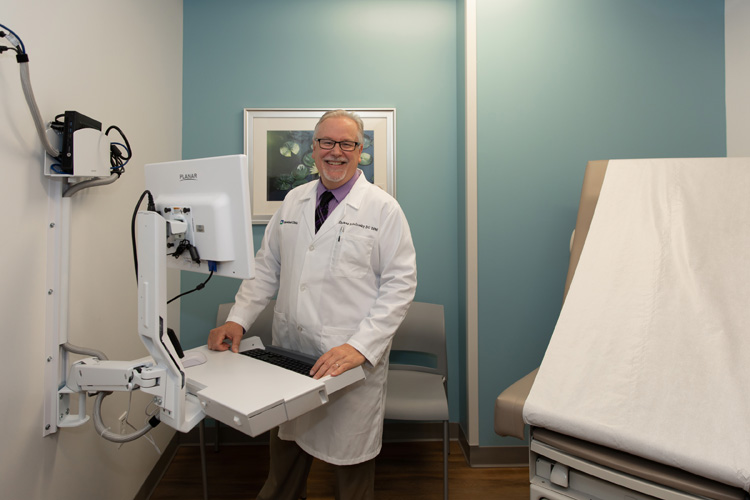Welcome to summer. Trips to the beach, outings on boats, tennis, golf – and dehydration.
For those who don’t head north, summertime in Florida is the dehydration season, and dehydration can be downright dangerous. Especially for seniors.
While the base definition of dehydration – losing more fluids than you take in – might sound relatively benign, it’s not.
Just ask Dr. Thomas Schalcosky, the new director of family medicine at the Cleveland Clinic Indian River Hospital.
Dehydration, he says, can adversely affect your kidneys, your heart, your circulatory system and your brain, along with all your joints and muscles, which, he adds, “are 70 percent water.” In severe cases dehydration can lead to death.
So why are seniors especially prone to dehydration?
Because, “with age, you lose some of your sense of thirst,” according to the National Institute on Aging. And if you don’t feel thirsty, there’s a natural tendency not to replace the water you lose while “being physically active – running, playing tennis, golfing, bicycling or doing any type of sports activity like that,” Schalcosky adds.
In this climate, even less strenuous activities such as gardening, mowing the lawn and long summer walks can lead to dehydration.
Add the fact that many seniors take medications that can adversely affect their hydration levels, and you have the potential for big problems.
Asked if drug-induced dehydration is common, the genial Schalcosky turns somber.
“Absolutely,” he says, “especially for people who take a diuretic, like Spironolactone [which is used to treat heart failure and high blood pressure]. The stronger ones can actually dehydrate you completely. Patients who have heart failure, patients who are hypertensive or even those who have lower extremity edemas can dehydrate quicker, particularly in the hot sun. That’s a concern and a critical issue.”
And while many Floridians might automatically reach for a tall glass of iced sweet tea to hydrate, Schalcosky says there are other beverages that are better.
“Coffee does not count. Tea doesn’t count. They will dehydrate you. People will drink sweet tea or plain tea and think that’s hydration and it isn’t. That’s dehydration,” according to Schalcosky.
(That view of tea, however, is not universally held. While the caffeine in both coffee and tea does have some diuretic effect, the National Institutes of Health now says “statistical analysis has concluded that black tea offers similar hydrating properties to water.”)
Soft drinks, meanwhile, definitely don’t help with hydration.
“Coca Cola or Ginger Ale or Seven-Up, Dr. Pepper, Mountain Dew or any of those [actually] dehydrate you to a certain extent because they have phosphorous in them that depletes your electrolytes,” Schalcosky says.
Electrolytes are minerals in your body that have an electric charge. They are in your blood, urine and tissues. Electrolytes are important because they help balance the amount of water in your body, balance your body’s pH levels, move nutrients into your cells and move waste out of your cells.
Schalcosky suggests a pair of semi-exotic beverages to help fight the effects of dehydration: watermelon juice and coconut water.
“I do medical mission trips to Brazil and we go to outlying areas there where they have coconuts. That’s the best thing to hydrate [since] it has all the electrolytes that you need to hydrate yourself,” says this transplant from Ohio’s Cleveland Clinic.
Of course, if juicing whole watermelons on your kitchen counter or shimmying up the nearest coconut palm doesn’t appeal to you, many stores – including Publix, Target and Walmart – sell pre-bottled watermelon juice, and there are dozens of coconut waters available with brand names like Vita Coco, Zico and Price & Spring from which to choose.
And then there’s water: straight from the tap or inside any one of the 200-plus brand-name bottles that line our supermarket’s shelves.
Asked if some of those bottled brands might be better than others, this affable physician tactfully declines to name names but does say “the alkaline water seems to be better because it’s closer to what your natural pH is. Spring waters are very good because they have all the natural minerals. I recommend that.”
Bottom line, Schalcosky clearly agrees with Dr. Sandra Schneider of the American College of Emergency Physicians when she says “dehydration is very dangerous,” especially as the temperature and humidity rise.
So, as Florida’s summer heat starts to kick in, it’s very important to remember to keep yourself fully hydrated.
Dr. Thomas Schalcosky is the new director of family medicine at CCIRH. His office is at 3450 11th Court, Suite 201. The phone number is 772-794-3364.

